
Millennials vs Gen Z – Key Differences in Customer Service Expectations
By Uttam Kumar Dash
December 9, 2024
Last Modified: December 18, 2024
Great customer service is essential for businesses, especially with Millennials and Gen Z making up nearly 50% of the market. Understanding their expectations is crucial in today’s competitive landscape.
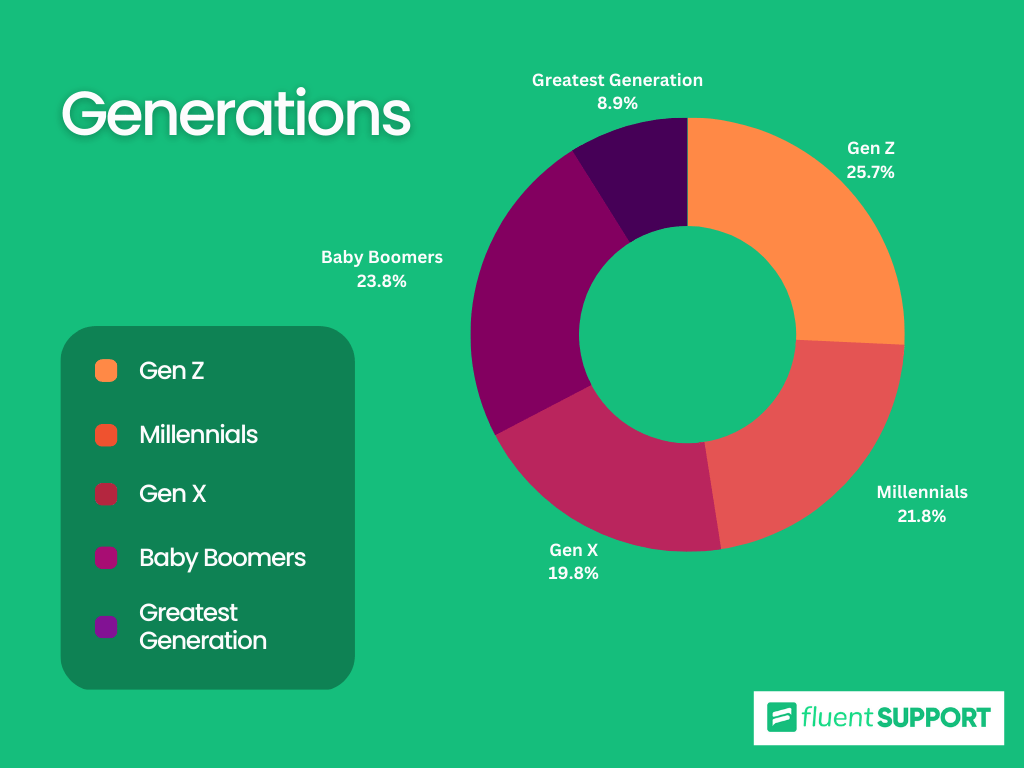
Millennials seek fast, personalized service, while Gen Z values honest, transparent interactions and self-service options. Both expect quick solutions and have grown up with technology.
By recognizing these differences in Millennials vs Gen Z, businesses can better meet their customer experience. Let’s explore how to deal with their unique customer service expectations.
Also, you can directly check out the key takeaways.
Millennials vs Gen Z
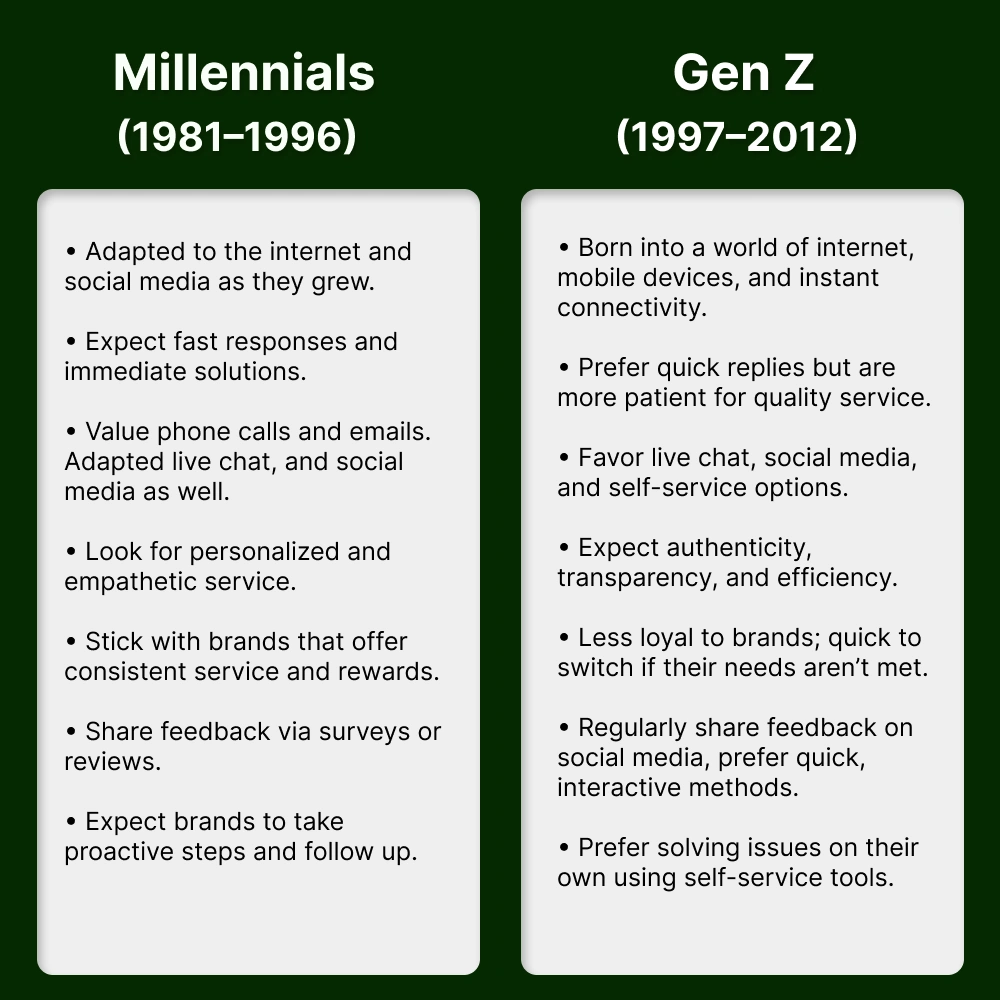
Gen Z and Millennial customers have unique preferences and expectations that shape how they interact with brands. As businesses adapt to changing customer needs, it’s important to understand what sets these generations apart.
Here are some major differences between Millennials and Gen Z.
Millennials and their age range
Millennials, also known as Generation Y, were born between 1981 and 1996. They come after Generation X and before Gen Z. In 2024, Millennials are between 28 and 43 years old.
This generation experienced the rise of technology during their teens and adulthood. In many underdeveloped or previously underdeveloped countries, millennials didn’t have easy access to technology in their early years. These regions missed out on the tech revolution of that era.
However, in the last 15–20 years, technology has become widely available. It made most millennials comfortable with digital tools today.
What influences Millennials
- Online reviews and feedback from trusted sources.
- Personalized recommendations tailored to their preferences.
- Experiences and quality, focusing on value over cost.
- Brand reputation with reliability and trustworthiness.
- Technology and convenience.
Gen Z and their age range
Gen Z or Generation Z, also known as the Zoomers. This includes people born between 1997 and 2012. They come after Millennials and before Generation Alpha (2010-2024). In 2024, Gen Z’s ages range from 12 to 27 years old.
They are the first generation to grow up surrounded all by technology. They’ve always had smartphones, social media, and the internet at their fingertips.
This group expects customer service to be fast and efficient, with personalized experiences that feel unique to them. Also, they research products online before making a purchase and rely heavily on social media and online reviews for guidance.
What influences Gen Z
- Their social media friends, peers in general, and word-of-mouth recommendations.
- Trending social media content that catches their attention.
- Ethical considerations, like sustainability, and fair practices.
How to meet customer service expectations of Millennials and Gen Z
Let’s take a look at strategies for meeting the expectations of both these customer groups.
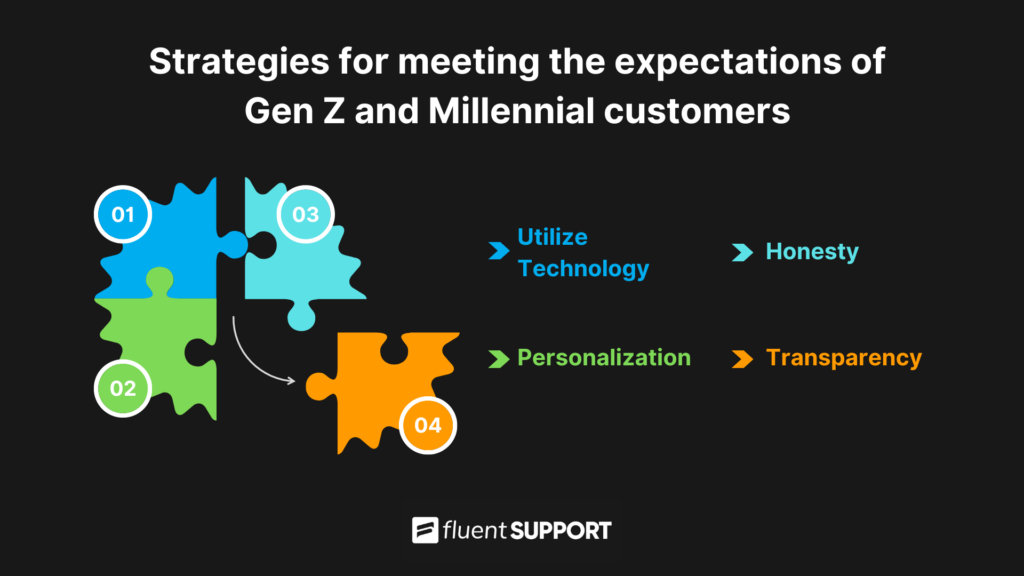
1. Use advanced technology for faster service
Gen Z expects instant responses, often through social media or live chat. Millennials also want fast service but are more open to email or phone support, in addition to chatbots and AI assistants for quick answers.
2. Personalize the customer experience
Both groups appreciate personalization, but Gen Z values brands that align with their values and are authentic. Millennials prefer a tailored experience but are more likely to stay loyal to brands that offer consistent, quality service.
3. Build loyalty with honesty and transparency
Gen Z highly values transparency and expects businesses to be open about their practices, especially on social media. Millennials also care about honesty but are more likely to stick with brands they trust over time.
Best practices for Gen Z and Millennials customer service experience
In order to deliver exceptional customer service for Gen Z and Millennials, businesses need to adopt a holistic approach. An approach that takes into account the unique needs and preferences of these groups.
1. Omnichannel support
One best practice is to use an omnichannel support approach. Provide customers with the option to reach out via every way possible like phone calls, email, forum, chat, open ticket option, and social media.
This allows customers to choose the method that is most convenient for them and ensures that their needs are met on time.
2. Empathy and efficiency
Train and build a strong customer support team. Teach them to be fast with issue resolution. Tell them to be empathetic and understanding towards the customers. Majority of the time less empathy, and sloth replies create a bad customer experience.
3. Empowering support agents
Equip support agents with all the necessary tools, knowledgebase, courses, mentorship, and other key resources they need to handle customer inquiries and complaints.
4. Personalized support
Encourage support agents to take a personalized approach. Use AI in helpdesk solutions for fine-tuning ticket replies, summarizing tickets, and customer tone analysis to run smooth interactions with customers.
5. Proactive customer feedback
Businesses need to be proactive in seeking feedback from their customers to serve better. This includes conducting surveys and focus groups, as well as monitoring online reviews and social media posts.
Use customer feedback forms to collect feedback from customers regularly. This will help your business to identify areas of improvement and make the necessary changes.
Role of social media for Millennials vs Gen Z customers
| Age Range | 13-17 | 18-25 | 26-34 | 35-44 | 45-54 | 55+ |
| 11% | 29% | 23% | 18% | 12% | 7% | |
| 4% | 13% | 30% | 27% | 17% | 9% | |
| Google+ | 9% | 23% | 35% | 15% | 11% | 7% |
| 0% | 18.1% | 31.2% | 24.8% | 15% | 10.5% | |
| 3% | 6% | 28% | 28% | 25% | 11% |
Gen Z prefers social media for almost everything, including customer support. They use it to ask questions, share feedback, or complain, expecting replies within minutes. Businesses need to respond to customer inquiries and complaints quickly.
A report shows that “90% of Gen Zers feel the overall presence on social media impacts their trust in a brand.” Although, millennials also turn to social media presence for validation but not as much as Gen Zers.
For Gen Z, engaging and relatable content is key to building brand loyalty. They are drawn to brands that show authenticity, ethical concerns, and connect with their values. According to Kadence, “Around 61% of Gen Z makes purchases influenced by social media”.
Millennials also value engaging posts but are more likely to be loyal if brands offer good service consistently and promotions.
Future of customer service for Gen Z and Millennials
As technology continues to evolve, so too will the customer service experience for Gen Z and Millennials. Businesses need to stay on top of the latest trends and technologies to meet the expectations of these groups.
- Immersive support: A trend to watch is the increased use of virtual reality and augmented reality in customer service. These technologies have the potential to provide immersive and personalized experiences for customers. Businesses that adopt them will have a competitive advantage.
- Voice assistants: Increase the use of voice assistants like Amazon Alexa and Google Home. This technology makes it easier for customers to access customer service and can provide more efficient service.
Key takeaways
| Aspect | Millennials (1981–1996) | Gen Z (1997–2012) |
|---|---|---|
| Birth years | Born between 1981 and 1996 | Born between 1997 and 2012 |
| Digital experience | Grew up with the rise of the internet and social media. They adapted to technology over time. | Digital natives who have never known a world without internet, mobile devices, and instant connectivity. |
| Customer service speed | Demand quick responses and real-time solutions. | Prefer fast responses but are more willing to wait for quality service. |
| Communication style | Value phone and email support but have embraced live chat and social media. | Strong preference for live chat, social media, and self-service options. |
| Service expectations | Higher expectations for personalized and empathetic service. | Seek authenticity, transparency, and efficiency. |
| Brand loyalty | More likely to stick with brands that deliver consistent service and loyalty rewards. | Less brand loyal; quickly shift to competitors if expectations aren’t met. |
| Problem-solving approach | Expect proactive service and follow-ups from brands. | Prefer self-service tools and resources to solve issues independently. |
| Feedback habits | Provide feedback through formal surveys or reviews. | Frequently share opinions on social media and prefer quick, interactive feedback methods. |
| Workplace traits in general | Hardworking, disciplined, and adaptable to evolving workplace norms. | Innovative, confident, and pragmatic, focused on finding efficient solutions. |
Final thoughts
To wrap up, providing excellent customer support for Gen Z and Millennials requires a balance of technology and human interaction. These customers value quick responses but also appreciate a personal touch.
While chatbots can handle basic questions, having live agents available for complex issues is crucial. For that reason, you need to build a strong customer support team. Personalizing service and being transparent builds trust with your customers.
By using the right tools and offering real, empathetic support, being up-to-date, businesses can meet the expectations of these generations and create lasting customer loyalty. Stay tuned with Fluent Support for more helpful tips!
Start off with a powerful ticketing system that delivers smooth collaboration right out of the box.





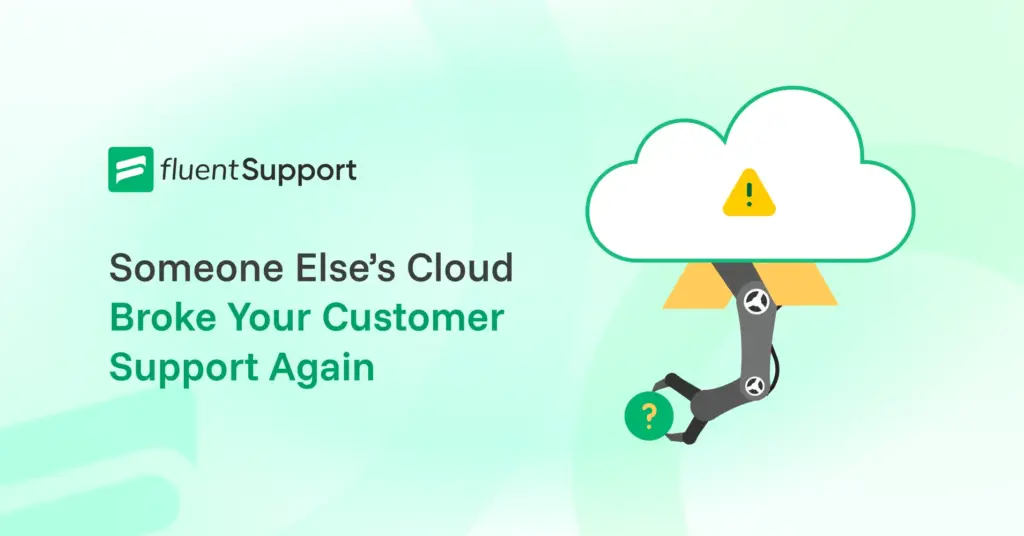

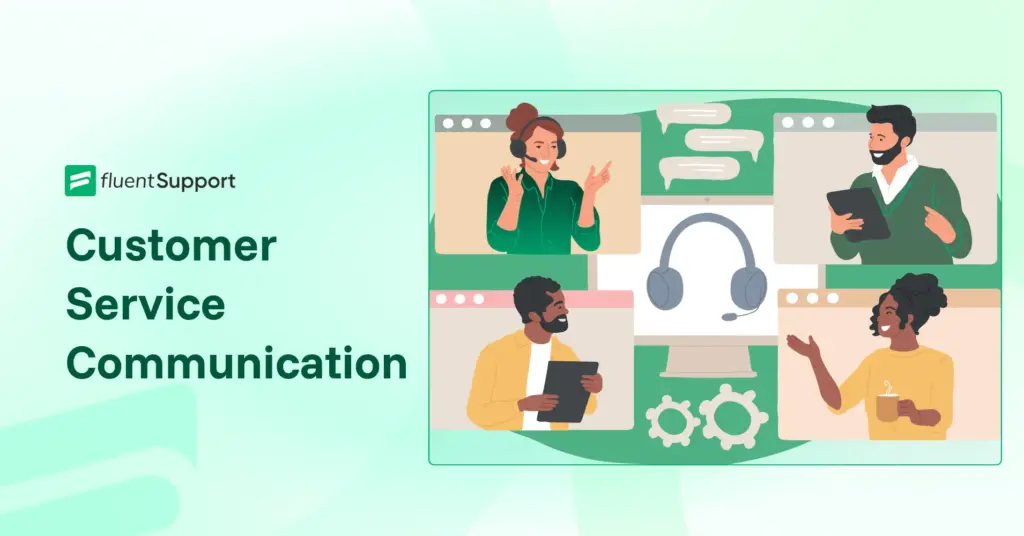
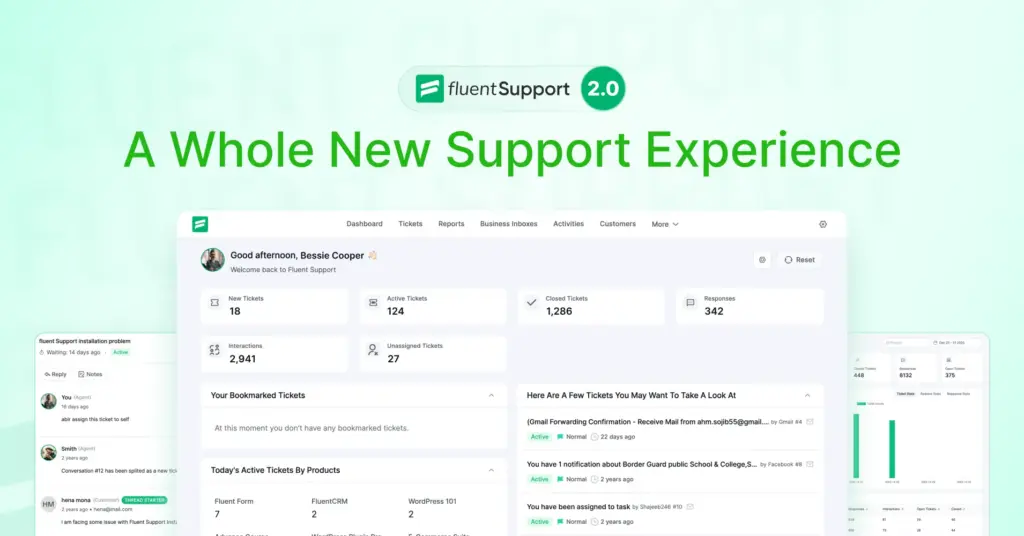

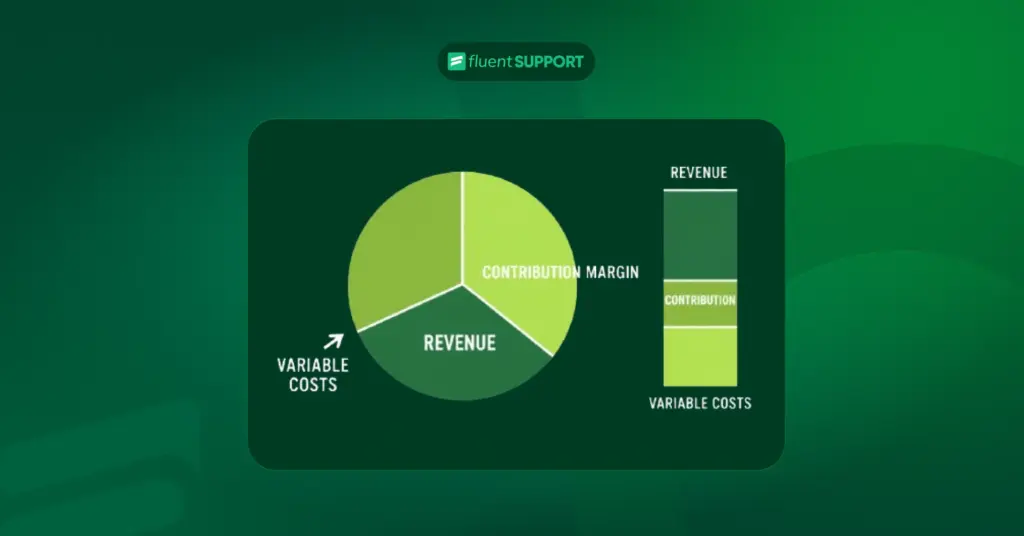

Leave a Reply